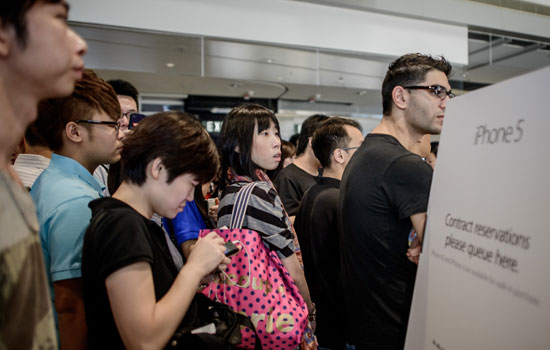
|
 |
|
Customers line up for the iPhone 5 at a Hong Kong Apple store on Sept 21, when Apple released its latest handset in the region. [Photo/Agencies] |
Despite mixed reactions upon its launch, the iPhone 5 has become a hot ticket item and is in short enough supply to have created a market for scalpers on the Chinese mainland and in Hong Kong.
Scalpers have been reselling the hard-to-get iPhone 5 for up to 3,000 yuan ($480) more than the fixed price set by Apple.
The iPhone 5 was launched in Hong Kong and a number of other countries and regions on Sept 21. Instead of selling the phone on a first-come-first-serve basis, Apple introduced a new policy requiring customers to reserve a phone online using a form of identification, but said they can not promise that all reservations will secure a phone.
The iPhone 5 is expected to be released on the mainland at the end of the year. The delay has created an unmet demand for the phone among mainland customers, a market now being exploited by smugglers and scalpers who are selling the phone in the place of licensed vendors in the fast-growing economy.
The resale prices of an iPhone 5 with 16 gigabytes of storage without a telecom contract ranges from HK$7,600 ($980) to HK$8,600. Apple prices the model at HK$5,588.
Hong Kong residents can reserve up to two iPhones online from 9 am to 5 pm every day. But only a lucky few will receive a notice from Apple telling them they can pick up an iPhone 5 at the store the next day.
The "draw" has been operating for one month, and has become a daily game for many. Though the odds are slim, many people see no harm in investing a few minutes to take a chance with the reservation system.
Matthew, a 27-year-old living in Hong Kong who works in marketing, has sold six iPhone 5s over the past month. His secret is to use as many forms of identification as possible to reserve the phones.
"I have three valid licenses: the Hong Kong ID card, my passport and my Home Visit Permit. So does my father, mother and my brother. So I make 12 reservations every day, each for two iPhones," he told China Daily.
While some people trust in luck and persistence to get their hand on a phone, a local newspaper reported that some people have hired information technology specialists to write programs that can automatically make the reservations.
Program-writer Horris Tse said writing such a program is not difficult for most above-average programmers.
In recent years scalpers lining up outside Apple shops to buy up new products to resell has become a common sight.
In January, a small riot broke out between scalpers waiting in line for an iPhone 4S at an Apple store in Beijing. That incident prompted Apple to impose the reserve-and-pickup policy in an attempt to deter scalpers.
Venders said that the phones originating from Hong Kong retail stores have a guarantee that is valid on the mainland. But Apple stores in China "would not fix phones from the United States".
At least 9,000 iPhone 5s had been sold through Taobao by Sunday afternoon, the biggest online shopping platform in China, according to sales records counted by a China Daily reporter.
A vendor on Taobao, who only identified himself as Cheng, said prices have been volatile.
The vendor, who sold more than 1,000 phones online, said the availability of the phone is affected by a lot of "uncertain factors".
"It is common that supply and demand become imbalanced in the short term. The price therefore changes fast. There is even a huge difference between the morning and the afternoon."
Faced with a growing trade in smuggled Apple products, Chinese customs has been cracking down on the smuggling of all iPhones.
According to figures from the Shenzhen customs authority, in the week after the iPhone 5 was launched in Hong Kong, there were 229 cases of smuggled phones. Hong Kong newspaper Wen Wei Po reported that local customs intercepted large quantities of electronic products including 227 iPhone 5s last week.
Contact the writers at [email protected] and [email protected]